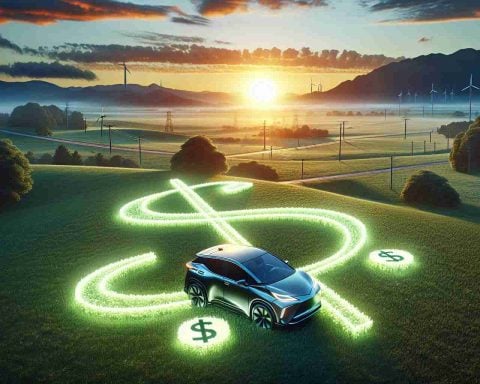- A Chinese EV battery parts manufacturer has established a production facility in Morocco to cater to European and North American markets.
- The joint venture, COBCO, is a collaboration between CNGR Morocco New Energy and Al Mada, focused on producing nickel-based battery materials.
- This initiative supports a $2 billion investment aimed at creating a sustainable battery supply chain.
- Future plans include expanding production to lithium-iron phosphate materials and advanced recycling facilities.
- The facility has the potential to produce 70 gigawatt-hours of energy, sufficient for over 1 million electric vehicles annually.
- This development enhances Morocco’s industrial capabilities and positions Chinese firms as leaders in the evolving automotive sector.
In a groundbreaking move, a Chinese electric vehicle (EV) battery parts manufacturer has launched production in Morocco, setting its sights on the booming markets of Europe and North America while cleverly sidestepping hefty Western tariffs. CNGR Morocco New Energy, a subsidiary of China’s CNGR Advanced Material, has partnered with African investment firm Al Mada to establish the joint venture COBCO. Their state-of-the-art facility near Jorf Lasfar recently commenced production of nickel-based precursor cathode active materials (PCAM), marking a significant milestone in the automotive industry.
As part of a $2 billion initiative signed in 2023, this facility is aimed at creating a comprehensive supply chain for sustainable battery materials. It will initially focus on producing nickel-cobalt-manganese (NCM) battery materials, essential components for lithium-ion batteries that power EVs. This strategic venture is poised to elevate COBCO as a major player in the ever-growing global demand for battery components, particularly within European and American markets.
But that’s not all! Future expansions are already on the blueprint, targeting the production of lithium-iron phosphate (LFP) materials and advanced recycling facilities. Once fully operational, this plant could have a staggering production capacity of 70 gigawatt-hours, enough energy to power over 1 million electric vehicles annually.
The takeaway? This Moroccan initiative not only strengthens Morocco’s industrial capabilities but also positions Chinese firms at the forefront of a rapidly evolving automotive landscape, redefining the future of electric mobility across the globe. Stay tuned as this transformation unfolds!
Revolutionizing the EV Industry: Morocco’s New Battery Hub
The Rise of Battery Production in Morocco
In a significant development within the electric vehicle (EV) sector, CNGR Morocco New Energy, a subsidiary of CNGR Advanced Material, has initiated production in Morocco. This strategic move allows the company to cater to the flourishing markets in Europe and North America while cleverly avoiding substantial Western tariffs. The establishment of COBCO, a joint venture with the African investment firm Al Mada, marks a pivotal moment in the automotive industry’s quest for sustainability and efficiency.
Key Highlights
– Investment and Capacity: The joint venture represents a $2 billion investment, focusing on developing a robust supply chain for sustainable battery materials. The facility near Jorf Lasfar will primarily produce nickel-cobalt-manganese (NCM) battery materials essential for lithium-ion batteries.
– Production Scale: With an expected capacity of 70 gigawatt-hours, this facility could potentially power over 1 million electric vehicles annually, showcasing its significance in addressing the rising global demand for EV components.
– Future Prospects: Plans for expansion include the production of lithium-iron phosphate (LFP) materials and advanced recycling technologies, which will further enhance the sustainability aspects of the battery supply chain.
Related Insights
– Market Trends: The demand for nickel-based precursors and other sustainable battery components is projected to surge in the coming years, driven by stricter emissions regulations and growing consumer preferences for electric vehicles.
– Sustainability Focus: The initiative not only bolsters Morocco’s industrial landscape but also emphasizes sustainability as electric mobility becomes central to global automotive strategies.
– Innovation in Recycling: The integration of recycling facilities within the production plans aims to create a circular economy model, which is crucial for the sustainable development of battery materials.
Frequently Asked Questions
1. What are the environmental benefits of producing EV batteries in Morocco?
The production of EV batteries in Morocco is expected to enhance local industrial capabilities while reducing logistics emissions due to closer proximity to European markets. Additionally, with future plans for advanced recycling, the initiative promotes sustainability in battery usage and lifecycle management.
2. How does this venture affect the global supply chain for EV batteries?
By establishing a production base in Morocco, CNGR can supply battery materials directly to European and American manufacturers, minimizing reliance on Asian imports and mitigating the impact of global supply chain disruptions.
3. What role does Morocco play in the global electric vehicle ecosystem?
Morocco is positioning itself as a strategic hub for battery manufacturing, providing essential materials needed for EV production and contributing to the global transition to electric mobility.
For More Information
To delve deeper into the electric vehicle industry and its developments, visit Electrive for the latest news and insights.
This initiative by CNGR Morocco New Energy has the potential to transform not just local economies but also the broader landscape of the electric vehicle industry, driving innovation and sustainability in a rapidly evolving market.



















